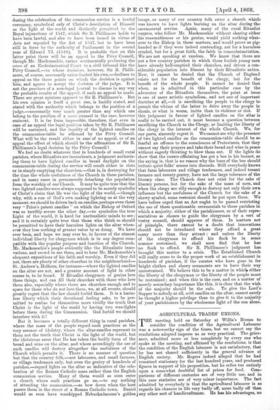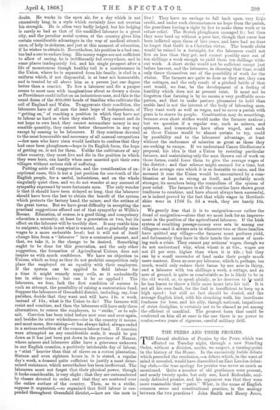AGRICULTURAL TRADES' UNIONS.
THE meeting held on Saturday at Willis's Rooms to consider the condition of the Agricultural Labourer was a noteworthy sign of the times, but we cannot say the resolutions adopted impress us as very practical. The griev- ance, admitted more or less completely by every one who spoke at the meeting, and affirmed by the resolutions, is that the condition of the English labourer is not satisfactory, that he has not shared sufficiently in the general advance of English society. Mr. Rogers indeed alleged that he had remained stationary for the last hundred years, and produced figures in support of his proposition, but he relies too entirely upon a somewhat doubtful list of prices for food. Com- parisons of different centuries are of very little use, and in this case statistics are of very minor importance. The fact admitted by everybody is that the agricultural labourer is as regards his chances in life very badly off, more badly off than any other sort of handicraftsman. He has his advantages, no
doubt. He works in the open air, for a day which is not excessively long, in a style which certainly does not overtax his strength. He is often very badly lodged, but his lodging is rarely so bad as that of the unskilled labourer in a great city, and the peculiar social system of the country gives him certain considerable advantages in the way of medical attend- ance, of help in sickness, and just at this moment of education, if he wishes to obtain it. Nevertheless, his position is a bad one, too bad a one to endure long. His money wages are not sufficient to allow of saving, he is indifferently fed everywhere, and in some places inadequately fed, and his single prospect after a life of monotonous though healthy toil is a maintenance in the Union, where he is separated from his family, is clad in a uniform which, if not disgraceful, is at least not honourable, and is treated by all above him as a person just one degree better than a convict. To live a labourer and die a pauper seems to most men with imaginations about as dreary a doom as Providence could inflict on an industrious man, and this is the usual doom of the 400,000 heads of families who cultivate the soil of England and Wales. To aggravate their condition, the labourers have of all men the least hope of independence, of "getting on," of reaching a position in which they have not to labour as hard as when they started. They cannot and do not hope to own land, they cannot accumulate money in any sensible quantity, they cannot better themselves in any way except by ceasing to be labourers. If they continue devoted to the most honourable and necessary of all manual occupations —few men who have risen would hesitate to confess that they had once been ploughmen—hope in its English form, the hope of getting on, is not for them. Unlike the cultivators of any other country, they must live and die in the position in which they were born, can hardly when once married quit their own villages without serious risk of suffering.
Putting aside all exaggeration, and the consideration of ex- ceptional cases, this is not a just position for one-tenth of the English people, for a useful, industrious, and, on the whole singularly quiet class, and we do not wonder at any amount of sympathy expressed by more fortunate men. The only wonder is that it should have been delayed so long, that the labourer should have been the last to obtain the benefit of the system which protects the factory hand, the miner, and the artisan of the great towns. But we have great difficulty in accepting the practical suggestions offered out of that sympathy at Willis's Rooms. Education, of course, is a good thing, and compulsory education a necessity, at least for a generation or two, but its effect on the labourer will be terribly slow. It may enable him to emigrate, which is not what is wanted, and so gradually raise wages to a more endurable level; but it will not of itself change him from a " labourer " into a contented peasant, and that, we take it, is the change to be desired. Something ought to be done for this generation, and the only other suggestion, the formation of Agricultural Unions, does not inspire us with much confidence. We have no objection to Unions, which as long as they do not prohibit competition only place the employed on an equality with their employers. If the system can be applied to field labour for a time it might remedy many evils, as it undoubtedly has in other trades ; but can it be so applied ? The labourers, we fear, lack the first condition of success in such an attempt, the possibility of raising a sustentation fund. Suppose the labourers of Greenfield district, including, say, four parishes, decide that they want and will have 14s. a week, instead of lls., what is the Union to do ? The farmers will resist and combine, and then the labourers will have only three alternatives, to coerce the employers, to "strike," or to sub- mit. Coercion has been tried before now over and over again, and besides its utter wickedness—for in the country it means, and must mean, fire-raising—it has always failed, always ended in a serious reduction of the common labour fund. If coercion were attempted on any considerable scale, it would be put down as it has just been put down in the province of Namur, where miners and labourers alike have a grievance unknown in our English counties, a positively intolerable day of labour, a " stint " heavier than that of slaves on a cotton plantation.
Sixteen and even eighteen hours is, it is stated, a regular day's work, a demand quite sufficient to justify a most deter- mined resistance, which nevertheless has been ineffectual. The labourers must not forget that their physical power, though it looks considerable, is very slight ; that they are outnumbered by classes devoted to order, and that they are scattered over the entire surface of the country. Then, as to a strike, suppose it organized,—so organized that field labour is sus- pended throughout Greenfield district,—how are the men to live ? They have no savings to fall back upon, very little credit, and under such circumstances no hope from the parish, the guardians having a right by law to make them work or to refuse relief. The Scotch ploughmen managed it ; but then they were bred up without a poor law, though that curse has been inflicted upon them of late years, and have had no time to forget that thrift is a Christian virtue. The benefit clubs would be ruined in a fortnight, for the labourers could not live on less than they get, and cannot possibly save out of ten shillings a week enough to yield them ten shillings with- out work. A short strike would not be sufficient except just before harvest, and the labourers, in choosing that time, would only throw themselves out of the possibility of work for the winter. The farmers are quite as dour as they are, they own the cottages, and the only result of a pitched battle of that sort would, we fear, he the development of a feeling of hostility which does not at present exist. It must not be forgotten that farming is by no means a very profitable occu- pation, and that to make pasture pleasanter to hold than arable land is not the interest of the body of labouring men. They want work as well as wages, and to cover a parish with grass is to starve its people. Combination may do something, because even short strikes would make the farmers anxious ; but we question if a regular war, such as miners, and spinners, and ironworkers have often waged, and such as these Unions would be almost certain to try, could by possibility end to the labourers' advantage, at least without the endurance of miseries as great as those they are seeking to escape. If we understand Canon Girdlestone's proposal, his idea is that a Union by resisting particular farmers, and maintaining only the men thrown out of work on those farms, could force them to give the average wages of the district ; and that scheme might succeed for a time, but it is the average rate which it is so desirable to raise, and the moment it rose the Union would be encountered by a com- bination at least as strong as itself, and probably much stronger, its members being the controllers of the system of poor relief. The farmers in all the counties have shown great readiness to combine, and have almost always been successful, as is indeed proved by the fact that while wages in Hertford- shire were in 1768 7s. 3c1 a week, they are barely 10s. now.
We greatly fear that it is to emigration—or rather the dread of emigration—alone that we must look for an improve- ment in the position of the agricultural labourer. If the Irish system of remitting passage-money ever sets in among our villagers—and it always sets in whenever two or three families have quitted any village—the farmers must perforce yield, and fortunately they have in their hands the means of meet- ing such a crisis. They cannot pay artisans' wages, though we do not understand why, when wheat is at 65s., wages are not 25 per cent. higher than when it is 42s.; but they can by a small surrender of land make their people much more content. Even an acre per labourer, which is, perhaps, too much, would only reduce their farms by one acre in thirty, and a labourer with ten shillings a week, a cottage, and an acre of ground, is quite as comfortable as he is likely to be in the old world, or, to speak plainly, as he deserves to lee until he has learnt to throw a little more heart into his toil. It is not all his own fault, for the fuel is insufficient to keep up a high speed ; but still no fact should be denied, and the average English hind, with his slouching walk, his inordinate fondness for beer, and his silly, though national, impatience of strict discipline, is'certainly not to be classed as yet among the efficient of mankind. The greatest boon that could be conferred on him all at once is the one there is no power to confer,—two years of rigorous, careful military drill.































 Previous page
Previous page